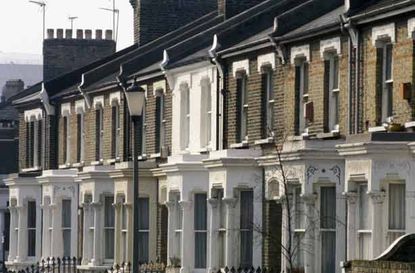How to rent your spare room
If you’ve heard you can earn £4,250 tax-free cash each year by renting out your spare room, you’re right. But before you jump in, there are a few things you need to know and consider before you take in a lodger. Read on to find out whether it’s right for you and how to go about it.


If you've heard you can earn £4,250 tax-free cash each year by renting out your spare room, you're right. But before you jump in, there are a few things you need to know and consider before you take in a lodger. Read on to find out whether it's right for you and how to go about it.
According to the English Housing Survey, 49% of homeowners under-occupy their homes. At the same time, there's been a 40% increase last year in homeowners looking for lodgers with around a million lodgers in the UK.
Whether you have debts to pay off, have been made redundant, are retired, have an 'empty nest' or just want some extra income, it's certainly an option to think about.
What can I rent? The government's Rent a Room scheme allows you to rent furnished accommodation in your only or main home. It can be one room or an entire floor but it can't be a self-contained flat i.e. with its own front door. It must be part of your house and be furnished. You're allowed to provide meals and laundry services but if you take payment for this, it must be added to the total rental income.
Bed-and-breakfasts and guest house owners can also take advantage – read HMRC's (HM Revenue & Custom) guide for traders.
How does the tax-free part work? Under the scheme, you can receive £4,250 tax-free gross income – this is halved (£2,125) if you share the rental income with your partner or someone else. If you don't normally fill out a tax return, you don't have to do anything – the tax exemption is automatic – as long as the amount you've made from the room in a tax year (6 April – 5 April) is under £4,250 (approximately £350 a month).
If you do fill out a tax return ordinarily e.g. you're self-employed, or the rental income is more than the threshold of £4,250, you will need to fill out a tax return and opt into the rent-a-room scheme to claim your tax-free allowance. There is more information on the gov.uk website about the opt-in scheme as some people are better off opting out and declaring the total income in the property section of the tax return.
GoodtoKnow Newsletter
Parenting advice, hot topics, best buys and family finance tips delivered straight to your inbox.
What if the rent is more than £4,250? If the rental income is more, you pay tax on the profit. In simple terms, this means you pay tax on the total income you've received minus expenses you're allowed to claim e.g. gas, electricity, water. This is a standard rental arrangement. Alternatively, you can pay tax on the gross income (that means the income before tax) minus the tax-free amount (£4.250) but you then lose any allowance for expense. The easiest way is to calculate your expenses and if they come to more than £4,250, choose the first option. If they're less, go for option two. You can change which one you use from year to year as long you let HMRC know. There's a good example on the moneyadviceservice.org.uk website to show why you might be better off doing one or the other.
If I rent my property, can I 'sub-let' a spare room? Some people think you need to be a homeowner to take advantage of this scheme, but if you rent, you can also benefit although it's not always possible. It depends entirely on the tenancy agreement you have. It is best to contact your landlord in any case.
Does the lodger have to be there all the time? Many people work away from home due to the current job market in particular – that means, they may only need accommodation during the week so you don't have to have someone living in your home seven days a week. Instead, you can rent the spare bedroom from Monday to Friday and it's all yours at the weekend. Just specify this when you advertise.
Do I want a lodger? It is worth taking time to consider if you want a lodger in your home, money advantages aside. They need to be able to use your kitchen and living space so if you're not sure about that, think carefully. On the plus side, if you live alone, you may appreciate the company and it isn't only students and young people who are looking for a room – people of all ages rent. It could be a Monday-Friday commuter, someone who needs affordable interim accommodation due to a break-up or divorce or a working professional who can't afford to rent their own place.
What do I need to provide? A good bed, decent lighting, good-quality curtains/blinds and hanging/storage space in a clean, nicely decorated room is the standard offering. You should keep it empty of any of your own objects apart from furniture. If you have wifi/broadband, that can be an advantage too and it must be well-heated for the winter months. It's a good idea to go through any rules as well e.g. if they can have guests, if bills are included and times for using the kitchen/lounge. You may want to ask if the smoke too.
How do I check the lodger is 'OK'?
Apart from meeting them in person, you can ask for references from a previous and current employer as well as proof of their permanent home address. Some people choose to do a credit checks but there will be an extra cost. It's standard to ask for a deposit equivalent to one month's rent too and to request payment by standing order.
How to find lodgers You can advertise in local shops or put up an ad online via websites such as spareroom.co.uk and their specialist website lodgers.com. Other websites include gumtree.com, roombuddies.com and housepals.co.uk. There are also dedicated websites such as weekday rental specialists www.mondaytofriday.com if you only want a lodger during the week.
Some websites charge for you to advertise your room but there can be advantages in terms of checking potential tenants and collecting rent.
More tips - Remember to keep records of the rent you receive and of any expenses. That means filing statements in an orderly way. Even though you can't claim expenses under the Rent-A-Room scheme, you might need this information if you decide you want to opt-out at a later date.
- If you own your home and have a mortgage, check with your lender that you can rent out a room. You should also contact your home insurer as not all home insurance policies allow a non-family member under their terms. If you're renting, check your lease and speak to your landlord/landlady before going ahead.
- Lodgers aren't tenants so if you need them to leave, you just ask as they don't have the same rights as tenants. However it is still a good idea to write up a simple agreement which states any deposit put down, rent amount, how it will be paid, notice period and house rules.
Find out more at gov.uk/rent-room-in-your-home
Where to next? How to sell your house Storage ideas for under a tenner Spruce up your home on a budget
Trusted, informative, and empathetic – GoodToKnow is the ultimate online destination for mums. Established in 2007, our 15-year-strong archive of content includes more than 18,000 articles, 1,500 how-to videos, and 7,000 recipes.
-
 Five categories of grandparent have been identified by psychologists, and we all want number #2
Five categories of grandparent have been identified by psychologists, and we all want number #2Psychologists studying the impact of grandparents in the lives of children have identified five key types, and you'll probably recognise yours instantly.
By Lucy Wigley Published
-
 Millennial dads are doing 4 things better than previous generations, but is it enough to lighten the mother's mental load?
Millennial dads are doing 4 things better than previous generations, but is it enough to lighten the mother's mental load?Millennial dads are definitely doing better than their previous counterparts, but there's still areas they can improve on their parenting to be truly equal to their partners.
By Lucy Wigley Published